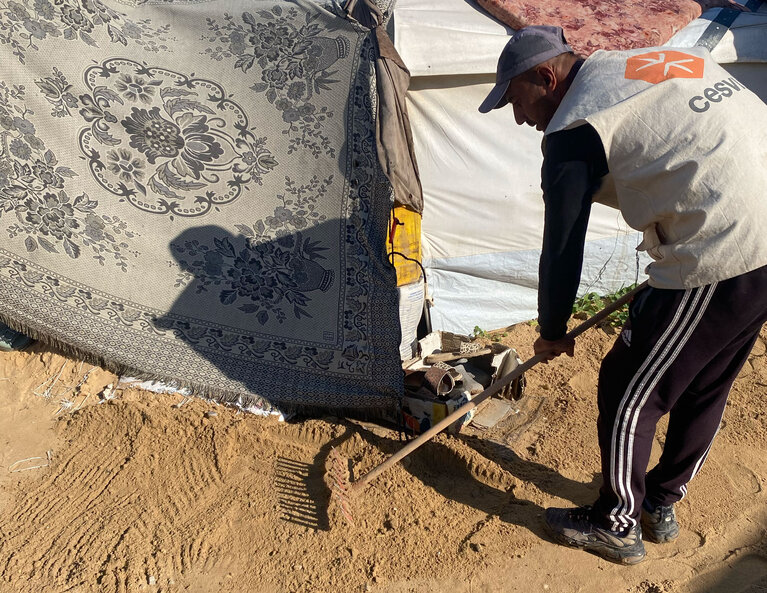Improving access to essential services in Gaza: the case of a displaced woman relying on a wheelchair
Since October 2023, when hostilities intensified in the Gaza Strip, internally displaced persons (IDPs) with disabilities have faced extreme challenges in accessing life-saving services and medical care. The rainy season has presented particular challenges, as the absence or collapse of infrastructure has increased the risk of flooding.
Shadida Mahani, a 60-year-old woman from northern Gaza, was displaced to the Saned area in western Khan Younis, southern Gaza, following intense bombardment. Living in a makeshift shelter, Shadida relied on a wheelchair for mobility and required daily oxygen therapy to manage chronic respiratory conditions. However, the area's damaged and uneven roads made it nearly impossible for her to travel safely to health facilities or even receive visits from medical teams.
“Confined to a wheelchair,” she said, “I was unable to reach the hospital for daily oxygen and essential medical treatment. The unsafe road conditions posed a constant threat to my wellbeing.”
Saned, one of the largest makeshift sites in the Gaza Strip, hosts thousands of IDPs who have fled airstrikes, bombardment, and destruction. The site lacks basic infrastructure, including proper roads, sanitation, and water supply. During the rainy season, the risks of flooding, limited access, and the spread of disease increased dramatically.
In October 2024, funded by the occupied Palestinian territory Humanitarian Fund (oPt HF), CESVI worked in 40 makeshift sites, including Saned, to strengthen flood resilience and improve access to essential services. The project adopted a cash-for-work modality to rehabilitate site infrastructure, including road paving and water drainage systems.
When CESVI’s team began their assessment, Shadida’s daughter approached them, pleading for help in making their path safer. The project team prioritized the rehabilitation of the road leading directly to Shadida's shelter. Workers filled potholes, leveled the surface, and ensured proper drainage.
“Thanks to CESVI’s vital support,” said Shadida, “I can now access the necessary medical care I desperately need. The improved road has eliminated the fear and distress that plagued my daily journey, allowing me to live with renewed hope and dignity.”
The intervention not only restored mobility and access to health care for Shadida but also exemplified how targeted, inclusive infrastructure support can transform lives and promote dignity, even amid crisis conditions.










